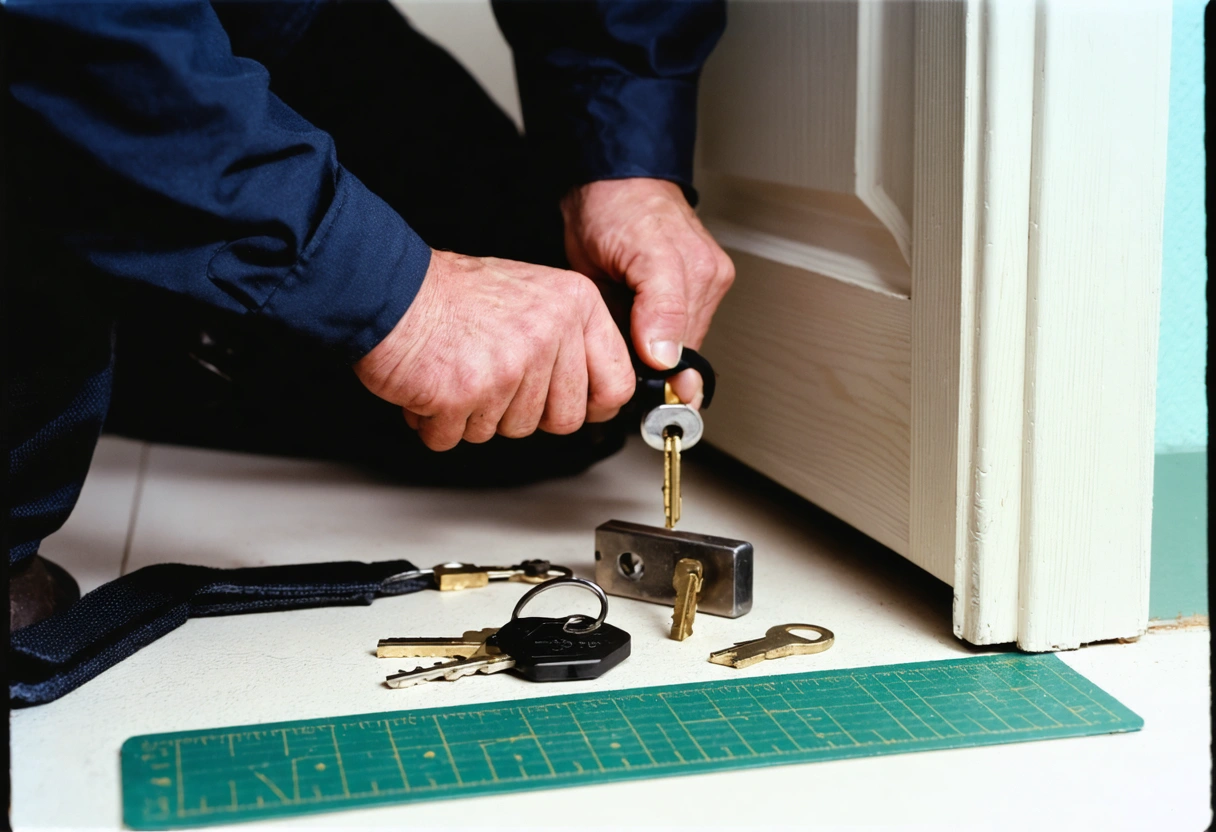Why Does Re-Keying After Moving Improve Security and Save Money?
Moving into a new home or office is an exciting milestone, but it also brings a host of new responsibilities. One crucial, yet often overlooked, aspect of settling into your new space is ensuring its security. Among the various security measures available, re-keying your locks stands out as an effective and cost-efficient solution. This post delves deeply into why re-keying after moving is essential for improving security while simultaneously saving money. We’ll also explore how the re-keying process works, compare it with lock replacement, discuss common misconceptions, and offer expert tips for making the transition to your new property as secure as possible.
Whether you are a first-time homeowner, a renter, a landlord, or a small business owner, understanding the value of re-keying can help you protect your property, assets, and loved ones. Let’s explore this important topic in detail, highlighting practical advice and insights from industry best practices.
Understanding Re-Keying: What Is It and How Does It Work?
Re-keying is a process where a locksmith alters the internal components of an existing lock so that it operates with a new key. Unlike replacing the entire lock, re-keying only changes the pins and tumblers inside the lock cylinder. This renders all previous keys useless, ensuring that only the new keys can open the doors. To learn more about the technical aspects of lock cylinders and their role in security, you can read this detailed guide on lock re-keying.
The re-keying process is relatively quick and straightforward for a professional locksmith. It typically involves removing the lock from the door, disassembling the cylinder, replacing the pins to match a new key, and reinstalling the lock. The result is a lock that is as secure as a brand-new one, but at a fraction of the cost. Homeowners and business owners can often re-key multiple locks to work with the same key, adding convenience and reducing the number of keys needed.
Why Is Re-Keying Necessary After Moving?
When you acquire a new property, you can never be certain about who may have copies of the existing keys. The previous owners, tenants, real estate agents, contractors, cleaning crews, pet sitters, or even neighbors could potentially have access. According to Consumer Reports, failing to secure your new home by re-keying or changing locks exposes you to unnecessary risks.
Re-keying immediately after moving in eliminates the uncertainty. With new keys in your possession, you regain complete control over who can enter your property. This is particularly important given that many break-ins occur without forced entry, often because an unauthorized person has a key. In residential and commercial moves alike, re-keying is a proactive measure that provides peace of mind and prevents avoidable security breaches.
The Security Benefits of Re-Keying
The primary motivation for re-keying is improved security. Here are some of the key ways re-keying enhances your protection:
- Eliminates unauthorized access: Old keys become useless, so anyone who previously had a copy can no longer enter your property.
- Customizes access control: You can decide who gets new keys and limit distribution strictly to trusted individuals.
- Prevents lock bumping and picking: During the re-keying process, locksmiths can upgrade the pins to high-security variants, making your locks more resistant to entry techniques such as bumping and picking.
- Enables master key systems: For businesses or multi-unit properties, re-keying offers the opportunity to establish a master key system, providing different levels of access for various users.
These enhancements not only protect your belongings and loved ones but can also deter opportunistic criminals who might otherwise take advantage of accessible keys.
How Re-Keying Saves Money Compared to Replacing Locks
Many property owners assume that security upgrades require expensive lock replacements. However, re-keying is almost always more affordable. Here’s why:
- Lower labor and material costs: Re-keying uses your existing hardware, so you avoid paying for new locks and handles.
- Time efficiency: Re-keying is typically faster than a full lock replacement, reducing labor charges and minimizing disruption to your day.
- Multiple locks, one key: If your new property has several locks, a locksmith can often re-key them to match a single key, reducing the need for duplicate keys and simplifying key management.
- Extends lock lifespan: If your current locks are in good condition, re-keying is a cost-effective way to maintain security without discarding perfectly functional hardware.
To compare the average costs of re-keying versus lock replacement, check this cost breakdown from HomeAdvisor. The savings are often substantial, especially for properties with multiple entry points.
Over time, the money saved by re-keying can be reinvested in other home improvements, security systems, or even insurance premiums, further enhancing your property’s value and safety.
Common Scenarios When Re-Keying Is Essential
While moving into a new property is the most obvious time to re-key, there are several other situations where re-keying is highly recommended:
- Lost or stolen keys: If you misplace your keys or they are stolen, re-keying ensures that whoever finds or takes them cannot access your home or office.
- After tenant turnover: Landlords should always re-key locks between tenants to protect both the new occupants and their investment.
- Divorce or roommate departure: Whenever someone with access moves out under less-than-amicable circumstances, re-keying restores your control over property entry.
- Employee turnover: For businesses, especially those with sensitive information or valuable assets, re-keying after a staff member leaves is critical for maintaining security protocols.
- Contractor or service access: If you’ve provided temporary access to contractors, cleaners, or other service providers, consider re-keying once their work is complete.
In each of these scenarios, re-keying prevents unauthorized entry and helps you avoid the costly consequences of a security lapse. For additional tips on keeping your property secure, consult Nationwide’s home security recommendations.
Re-Keying vs. Lock Replacement: When to Choose Each
While re-keying is suitable in most situations, there are times when replacing the entire lock may be necessary. Lock replacement is the better option if:
- Your current locks are damaged, corroded, or outdated.
- You want to upgrade to a higher-security lock, such as a smart lock or electronic deadbolt.
- Your locks do not support re-keying (rare for most residential locks, but possible with some designs).
- You wish to standardize your property’s locks with a new brand or style.
However, if your existing locks are in good working order and meet your security needs, re-keying is almost always the more practical and budget-friendly choice. For more information on evaluating your security needs and choosing between re-keying and replacement, visit this comprehensive resource on lock security.
How to Arrange for Re-Keying: What to Expect
The process of re-keying is straightforward, but there are steps you can take to ensure it goes smoothly. Here’s what to expect:
- Assessment: Contact a licensed locksmith to evaluate your current locks and discuss your security concerns. They’ll determine whether your locks are suitable for re-keying or if replacement is necessary.
- Scheduling: Set up a convenient time for the locksmith to perform the work. The process usually takes less than an hour for a standard home, though larger properties may require more time.
- Re-keying: The locksmith will disassemble each lock, change the internal pins and tumblers, and provide you with a new set of keys. If you desire, they can also re-key all locks to work with a single key for added convenience.
- Testing: Before leaving, the locksmith will ensure that all locks function smoothly with the new keys and that old keys no longer work.
It’s important to choose a reputable, insured locksmith to avoid scams and ensure quality workmanship. Ask for references, read online reviews, and verify credentials before hiring. For a checklist on what to look for in a locksmith, refer to the Federal Trade Commission’s guide on hiring a locksmith.
Tips for Maximizing Security After Re-Keying
Re-keying is a powerful first step toward securing your new property, but it’s just one part of a broader safety strategy. Here are additional measures to maximize your security:
- Distribute new keys wisely: Only give copies to trusted individuals and keep a record of who has each key.
- Consider upgrading to high-security locks: If your area has a high crime rate or you store valuables on the premises, ask your locksmith about options such as anti-pick or drill-resistant locks.
- Install additional security features: Door viewers, security chains, and smart locks can further enhance your protection.
- Maintain your locks: Regularly inspect and lubricate your locks to ensure smooth operation and longevity.
- Change codes and passwords: If your property uses electronic or smart locks, update passcodes, PINs, or Wi-Fi passwords immediately after moving in.
Remember, security is a layered approach. Re-keying sets a strong foundation, but ongoing vigilance and periodic reviews of your security protocols are equally important.
The Value of Re-Keying After a Move
Re-keying your locks after moving is a simple yet highly effective way to safeguard your property, assets, and loved ones. By preventing unauthorized access and eliminating uncertainty about who holds keys, re-keying delivers peace of mind and tangible security benefits. It also saves money by leveraging your existing hardware and avoiding unnecessary replacements. Whether you’re a homeowner, renter, landlord, or business owner, re-keying should be at the top of your post-move checklist.
Investing in re-keying is not just about security; it’s about empowerment and control. With the right approach and a trusted locksmith, you can enjoy your new space with confidence and focus on what truly matters—making it your own. For more information on home security and best practices, keep exploring reputable resources and stay informed about the latest developments in property protection.
Need help with Why Does Re-Keying After Moving Improve Security and Save Money??


